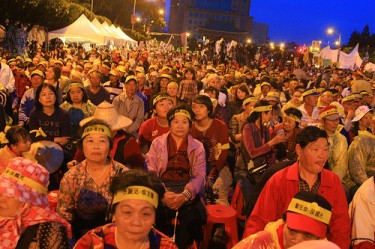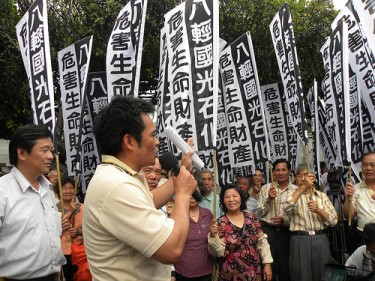Not quite wumao, but also perhaps not far off: bloggers in Taiwan have reportedly been sponsored to blog on the development plans of the controversial Kuokuang Petrochemical Technology Co.
The news, first made public by the Taiwan Environmental Information Center, suggests that funding comes from the Industrial Development Bureau within the Ministry of Economic Affairs. Among those writing on this is Green Party convener Pan Han-Shen [zh]:
經濟部工業局為了在網路上營造出石化產業安全又環保的假象,透過行銷公司邀請近30位部落客及行銷公司員工參觀中油高雄煉油廠及奇美南科A廠,了解廠區的 工安及環保狀況,參與活動並寫文章的部落客不但有5000元車馬費可以領,還有高檔便當、下午茶及伴手禮,不含行銷公司收費就花了十萬元,根本是拿人民血 汗錢做變相的置入性行銷。
In order to perpetuate an illusion that the petrochemical industry is safe and environmentally friendly, the Industrial Development Bureau has tasked a marketing company with inviting employees and roughly 30 bloggers to visit China Petroleum Company offices in Kaohsiung and the Chimei Southern Taiwan Science Park, to offer details of the company's industrial safety precautions and environmental conditions. Bloggers involved not only received NTD 5000 (approximately USD 172), but also an expensive take-away lunch, afternoon tea and souvenirs. In sum, officials spent NTD 100,000 on what amounts to a product placement scheme funded by taxpayer money, not including the commission paid to the marketing company.
經濟部工業局當日立即澄清,年度預算並編列該項工作項目,而且並未有該筆活動支出,該體驗活動出完全由funP 瘋體驗辦理,屬單純之民間活動,工業局只負責聯繫及協助辦理。翌日在記者對照兩方說詞後,國光石化工會總幹事謝俊雄坦承他們的確實是主辦單位,錢也是他們出的,對照兩造的說法如下:
The Industrial Bureau immediately claimed that spending for the mission wasn't included in the annual budget, that package tours mentioned above were arranged by FunP Crazy Experience Co., and that this was simply an act carried out by citizens. The Industrial Bureau, they noted, is only responsible for liaison and support. According to what has been reported, director-general of the Union of Kuokuang Petrochemical Hsieh Chun-Shiung confirmed the next day that the event was carried out by the company itself, compensation included. The story was written as thus:
謝俊雄痛批綠黨要環保不要經濟,長期歪曲事實,是根本無法溝通的極端份子。石化產業難免有汙染,但國光石化每年可提高台灣的GDP達2%,石化業對居民健康會造成負面影響也不明顯。石化公會總幹事謝俊雄則坦承,該單位確實是主辦單位,錢也是他們出的,他痛批綠黨要環保不要經濟,長期歪曲事實,是根本無法溝通的極端份子。石化產業難免有汙染,但國光石化每年可提高台灣的GDP達2%,石化業對居民健康會造成負面影響也不明顯。
Hsieh accused the Green Party of emphasizing ecology over the concerns of economic development, and a history of manipulating facts. He also asserted that the Green Party is an extreme group which cannot be reasoned with. While a certain extent of pollution exists within the petrochemical industry, however, Kuokuang Petrochemical contributes to 2% of Taiwan's annual GDP and has limited impact on the health of nearby residents.

Nov. 2010 protest against Kuokuang, from Flickr user pcbirdtw

April 2010 photo from the Taiwan Environmental Information Association Flickr account
綠 黨召集人潘翰聲痛批,所有證據都指向工業局確實是收買部落客的共犯,工業局和石化公會一搭一唱政商分際蕩然無存,甚至抹黑反國光石化後面有金主、 支持者是環保流氓,「犯錯還嗆聲,應該立即向全國人民道歉!」潘翰聲也反批石化公會的發言,「不僅沒有環保知識,也沒有經濟學常識」,因為國光石化對 GDP的貢獻根本就非常微小,並沒有必要性。
Pan of the Green Party, in turn, alleged that despite evidence showing the Industrial Bureau's complicity in bribing bloggers, the government and Kuokuang Petrochemical are singing the same tune in denying any existence of wrongdoing, even going so far as to slander critics as having wealthy backers. “When you make a mistake, instead of arguing loudly, you should apologize to the people,” goes Pan's criticism, saying Kuokuang's citing of GDP contribution and other comments are both irrelevant and show “lack of any ecological knowledge or economic sense.”
Global Voices Online Taiwan editor Portnoy is among the many paying close attention to government policy, and his comments on the blogger product placement news read:
台 灣政府處理重大政策爭議時,常常認為政府「宣導不夠」是產生爭議的主因,而不是政策本身有問題,所以就卯起來宣導。這才是最大的問題。處理政策爭議,應 該納入審議民主,例如之前要求辦理的聽證會,但政府卻草率辦理聽證會,隆重辦理「部落客石化業體驗活動」,這才是問題所在。
When the Taiwan government deals with a major policy controversy, they think that insufficient propaganda is the cause, not the policy it self. So they step it up. This is the main problem. When dealing with controversy, democratic processes should be adopted, a public hearing, for example. Instead, the government has chosen put heavy focus on the junket tour aspect, and that is the problem.
Bloggers who were identified by media as having taken money from the government have received a lot of attention from netizens, and many harsh comments. Some bloggers deleted the articles immediately, but some used what they witnessed to fight back, such as Yam blogger huiko1012:
早 在半個月前,就看到了國光石化即將動工的新聞,不可避免的,當地民眾當然極為反彈與抗爭,但大多數人對石化重工的形象還停留在三十年前,換個角度想,若將 石化重工全逼往對岸,對方的空氣及水污染一樣會影響到台灣,最可怕的是,對岸的環保心態及科技,均遠遜於台灣,我們除了喪失眼前的就業率、中期的國家競爭 力,還要承受未來不可知的污染傷害,…如果,未來的石化工業,是個重視工安、與環保平衡的重工業,那麼,一個能提昇國家競爭力,促進人民就業的國家級 廠區的設立,應該是樂見其成才是! –悅‧樂玩遊
Half a month ago, I heard the news that Kuokuang Petrochemical was about to begin construction. Inevitably, local residents didn't sit by, instead went on strike. But most of people have an outdated view of what the Petrochemical industry does. Also, if the petrochemical industry were forced to move to China, water and air pollution would still do harm to Taiwan. The worst of all this that the China has far less eco-sense and technology than Taiwan. Not only would we lose employment opportunities and competitiveness in the short term, but unknown amounts of pollution in the future…if the petrochemical industry of the future approaches safety based on eco-awareness, we should be glad to welcome it if it can make Taiwan more competitive and increase the number of jobs.
Indifferent to sarcasm from netizens, 波特曼 whose work focuses on environmental issues, replied in a neutral tone:
「雖然自己也算半個環保團體的人,但我不覺得版主有不對的地方,因為你就是去報告活動,而這活動有5千元車馬費領而已。而且大多部落客都持玩樂心情去,就跟我們去參觀水壩、工研院、或市政府之類一樣。如果可議,矛頭也該指向主辦活動的那些人。」
Though I consider myself part of a nearly-ecological group, I don't think bloggers have done anything wrong. Because you guys went on a subsidized tour and had NTD 5000 compensation to cover transportation fees. Most bloggers who participated were happy to do so, just as if we had gone on a field trip to a dam, an industrial technology research institute, or city hall. People should pick on those who hold such events rather than who attend them.
「不 過我倒是對大家紀錄中的一個部份感到很莞爾。因為他們竟然安排你們去參觀五輕廠看”工安”與”污染防治”,高雄人應該都記得2008年高雄五輕廠半年三次 大爆炸吧。至於那些煙囪除了水蒸氣還會排放出什麼,這個去網路上查一下就好了。很多東西,不是有臭味的才危險。…」
“However I'm confused by some of what was reported from the tour. They actually sent you to to visit the Petrochemical Refinery for a briefing on industrial safety and pollution prevention in Kaohsiung? Kaohsiung people will surely remember there were three major explosions there in 2008. As for what those smokestacks are pumping into the air, you can read all about it online. Lots of stuff, it turns out, and not everything that's dangerous has an odor…
Global Voices Online Lingua contributor HOW has also commented on the environment impact of Kuokuang Petrochemical:
對 於參觀石化廠這件事,就一個整天在化工廠和石化廠打滾的學習中從業人員而言,我才不相信你真的能看到什麼鬼。/但我也要說一點不中聽的:其實這些工廠還是 相當注意環保的,但不是注意環保是因為他們知道這些物質如果出去第一個死的會是自己人。但這一切的前提是他們知道排出來的是什麼。但問題也在於現在出現的 問題往往是不知道排出來的是什麼。
When it comes to a field trip to a petrochemical factory, speaking as an intern in chemical and petrochemical factory all day long, I don't buy it that they were actually able to see much. But I would like to speak the truth: “In fact, these factories do indeed have ecological sense, otherwise workers could easily be killed if they didn't take precautions. They know what emissions are. The question, however, is whether or not they know what's in those emissions.”
有些東西排出去以後一開始看不出有問題,但等到冷卻以後就麻煩了。例如戴奧辛的確可以被焚化塔燒成小分子出去,但一旦冷卻又會重新結合。這種問題才比較恐怖…
Some emissions cannot be identified by eyes alone, and only create problems when they cool down. For example, dioxions turn into molecules when incinerated, which are then passed out of the incinerator. Once they cool down, particles reassemble. This kind of issue is kind of terrifying…
Back specifically to the Kuokuang Petrochemical construction project, petrochemical industry professional Sakula Yoko shares even further insight:
首 先,國內石化產業賣的多半都是一些泛用塑膠,量大,但毛利差,品質也都只到「堪用」的狀態,製程幾十年不變,應用的泛圍多半就是包裝袋、垃圾袋、湯麵 袋、包裝膜、化學纖維,垃圾桶、置物箱,電扇殼、電視殼這些很粗大的東西。
First of all, Kuokuang Petrochemical sells plastic products for general use. Mass production, but gross profit is low. The quality is also barely usable. The process has not changed for decades. Plastic bags, trash bags, bags for noodles and soups, plastic wrapping, chemical fibers, trash cans, trunks, shell of fans, TV plastic shells, something unsophisticated, you name it.
而國外的石化廠他們做什麼?
So what exactly then do foreign petrochemical corporations do?
當然,泛用塑膠他們也做,但不是他們的主力。
They also of course make general purpose plastic products, but this is not their main product.
國外的石化廠他們的產出重點,在於工業用油及民生用礦油,比方說機油、潤滑油、液壓油這些東西。
Their emphasis is on industrial and home use oils, like engine oil, lubricants and hydraulic fluid.
[…]
所以,當我知道,政府要推動國光石化時,一開始我還滿欣慰的,想說政府終於想通了,要帶領整個產業來個大躍進,沒想到,看完國光石化的簡介後我大失所望,因為,國光石化要做的東西,不過就是像現在台塑、奇美、台聚這些集團一模一樣的東西!
So, when I first heard that the government had initiated the Kuokuang Petrochemical project, I was relieved and began anticipating a breakthrough. Instead, and to my disappointment, based on what I've learned from the introduction, the Kuokuang Petrochemical project is set to make the exact same products as are now made by corporations like Formosa, Chimei, and USI!
There have been many controversies of Kaokuang Petrochemical Project such as the location, industry strategy, and policies. Global Voice Online will continue to follow these issues and speak out for the truth that has been ignored by netizens. Welcome to join us on Facebook or Twitter!









3 comments